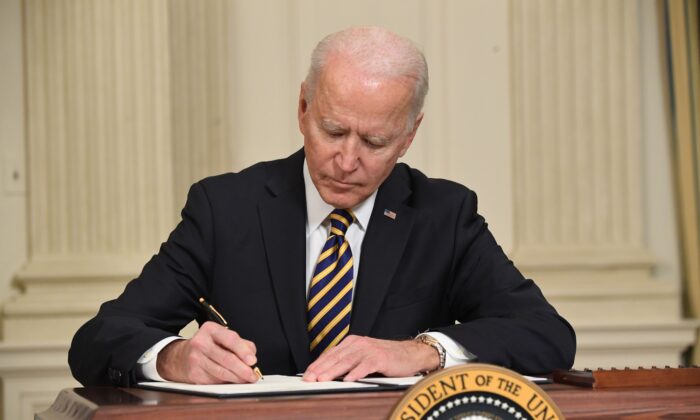Appeals Court Strikes Down Biden’s $15 Federal Contractor Minimum Wage, Citing Government Overreach
A court has ruled President Joe Biden exceeded his authority by issuing an executive order mandating a $15 minimum wage for federal contractors.
A federal appeals court has ruled that President Joe Biden exceeded his authority by mandating a $15 minimum wage for federal contract workers.
“The Government’s preferred interpretation would wildly expand the President’s authority,” Judge Ryan Nelson wrote in the opinion. “It would allow the President to require that all federal contractors certify that their employees take daily vitamins, live in smoke-free homes, exercise three times a week, or even, at the extremity, take birth control in order to reduce absenteeism relating to childbirth and care.”
The court found that the DOL’s rule improperly broadened the FPASA’s intended scope by setting wage policies without explicit congressional direction, thereby invalidating the DOL’s implementation of Biden’s executive order. Also, the court held that the DOL acted arbitrarily or capriciously when it failed to consider alternatives to the $15-per-hour minimum wage mandate. The court also found that even if the FPASA did allow for an expansive interpretation of presidential powers in terms of federal procurement rules, the DOL’s rule still would not serve the interests of economy and efficiency.
“DOL recognizes that its rule will cost federal contractors $1.7 billion and that this cost will likely be passed onto the government,” states the majority opinion, which notes that any benefits from increased productivity and reduced turnover due to the higher wage would not offset the costs to a meaningful degree.
In dissent, Judge Gabriel Sanchez argued that Biden’s executive order falls well within the president’s broad authority under the FPASA to direct federal agencies in setting terms for federal contracts. He also contended that the DOL acted within its discretion and did not act arbitrarily or capriciously when implementing the executive order as a binding directive.
“The plain text of the Procurement Act, longstanding judicial precedent, and executive practice since its enactment all confirm that President Biden has the authority to direct federal agencies in this manner,” Sanchez wrote in the dissenting opinion.
The decision overturned a lower court’s ruling that had upheld the executive order. The case was initially brought by five states—Arizona, Idaho, Indiana, Nebraska, and South Carolina—which challenged the wage mandate, arguing that it would impose undue financial burdens on state agencies and businesses engaged in federal contracts.
The states sought a preliminary injunction while the government sought dismissal or a summary judgment. A district court denied the injunction and granted the defendants’ motion to dismiss, concluding that the wage mandate did not violate the FPASA and that the rule was not subject to arbitrary-or-capricious review because the executive order required the DOL to adopt the policy.
Four of those states—Idaho, Indiana, Nebraska, and South Carolina—appealed the ruling to the 9th Circuit.
Nebraska Attorney General Mike Hilgers called the appellate court’s decision a “win for separation of powers and the Constitution.”
Neither the White House nor the Department of Justice, which represented the government in the case, responded to The Epoch Times’ request for comment.





